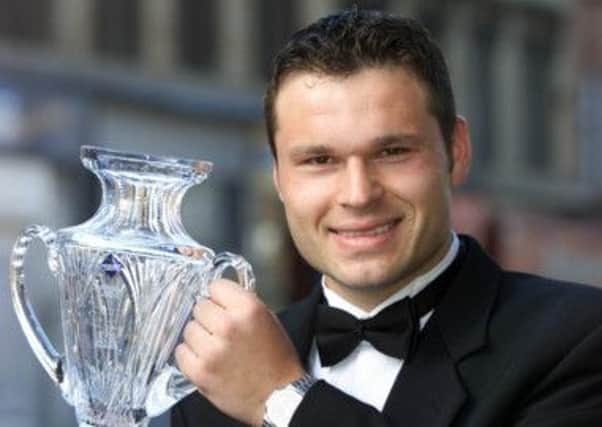Stephen Halliday: Lennon not first to query awards


Since its inception back in 1978, 13 years after the country’s oldest individual award was established by the Scottish Football Writers’ Association, the prize handed out by players to one of their fellow professionals has often caused a stir.
Having led Celtic to a second successive Premier Division title back in 1982, for example, McNeill might have anticipated one of his outstanding performers that season, such as Murdo MacLeod or Tommy Burns, to take the plaudits.
Advertisement
Hide AdAdvertisement
Hide AdInstead, the Scottish Professional Footballers’ Association, as it was then, named Sandy Clark as their Player of the Year, despite the striker playing for an Airdrie side which finished bottom of the table and was relegated.
Three years later, even staunch union man Ferguson might have questioned the collective wisdom of an organisation he helped to establish. His imperious Aberdeen side were crowned champions in convincing style that season, only for their fellow pros to overlook them in favour of Jim Duffy, who played in a Morton side which conceded 100 goals and was relegated.
Fast forward to 2000 and it was Advocaat’s turn to discover that his rampant Rangers team, SPL winners by a record margin of 21 points, had lost out on the SPFA award to Mark Viduka in a Celtic team which endured a turbulent season under the ill-fated management of John Barnes and Kenny Dalglish.
None of this is intended to cast aspersions on Clark, Duffy and Viduka, all fine footballers who excelled for their respective teams in difficult circumstances in each of the seasons concerned.
But it does highlight why Lennon’s dismay at the omission of all of his players from this year’s PFA Scotland short-list should be tempered by a realisation that professional footballers often see things a little differently from the rest of us. That doesn’t necessarily mean they are wrong, just different.
There has long been a good-natured debate between players and reporters over which Player of the Year award carries the greater merit.
Understandably, those who earn their living on the field consider themselves the best judges, a position robustly maintained by current PFA Scotland chief executive Fraser Wishart, who stresses there is no greater honour than for a player to be recognised by his peers.
It is a mantra he will repeat at next Sunday’s gala dinner at the Glasgow Hilton as the end-of-season awards circuit in Scottish football gets under way. It will be followed by SPL sponsors Clydesdale Bank’s own bash on 13 May and then the most prestigious of them all (sorry Fraser) when the SFWA hold our annual bash on 19 May.
Advertisement
Hide AdAdvertisement
Hide AdAs the journalists prepare to cast our votes, it is easy to sympathise with the dilemma faced by the PFA members in a season when there has not been one truly outstanding performer who has long looked a “stick on” for the award.
While the case for 27-goal Hibs striker Leigh Griffiths is increasingly compelling, this correspondent believes the SFWA Player of the Year should be a Celtic player. Step forward Kris Commons, who has netted 18 times in 36 starts for the SPL champions while not operating as an out-and-out striker and who has often delivered on the big occasion. Commons started the season superbly, making his omission from Craig Levein’s Scotland squad for the opening World Cup qualifiers difficult to comprehend, and has been as consistent as any in a Celtic team who could yet add the Scottish Cup to their success in retaining the SPL and reaching the last 16 of the Champions League. The latter achievement, incidentally, should, in my view, be enough to earn Lennon the Manager of the Year award.
As Wishart has patiently pointed out, these awards are all the result of democracy in action. But perhaps Lennon might presently agree with Winston Churchill’s observation that the best argument against democracy is a five-minute conversation with the average voter.
SPL clubs must unite to introduce play-offs
SO MUCH for “no cherry-picking”. It turns out it wasn’t “now or never” after all. Apparently, Armageddon for Scottish football has been postponed yet again.
Despite all of the ludicrously apocalyptic language used by Aberdeen chairman Stewart Milne and some of his SPL counterparts two weeks ago, they will reconvene at Hampden today in a bid to salvage parts of their league reconstruction plan. Mercifully, the abonimation of a 12-12-18 set-up which would have involved the top two tiers splitting into three groups of eight teams midway through a season is no longer on the agenda. That particular rotten cherry has been left to wither and die.
It remains to be seen if the alternative being put forward, of promotion-relegation play-offs between the SPL and the First Division, can avoid the same fate. It will take considerable selflessness on the part of several club chairmen if it is to achieve the 11-1 support needed today. But if it is truly the time to set self-interest aside, as we were told in the most patronising terms by a succession of the 12-12-18 proponents in the build-up to the last vote, then it is certainly an attractive compromise.
When play-offs were held between the second-bottom club in the Premier Division and the runners-up in the First Division for three successive seasons from 1995 to 1997, huge interest and big crowds were attracted for the clashes between Aberdeen-Dunfermline, Dundee United-Partick Thistle and Hibs-Airdrie respectively. If a new financial distribution model is introduced in a reunified single league governing body, then the blow to any top-tier club being relegated by way of the play-offs would be softened.
As we are about to witness once more in England, not to mention in the lower tiers of the SFL, play-offs bring a unique sense of drama and opportunity to club football. Hopefully at least 11 SPL chairmen will be bold enough to see it that way today.